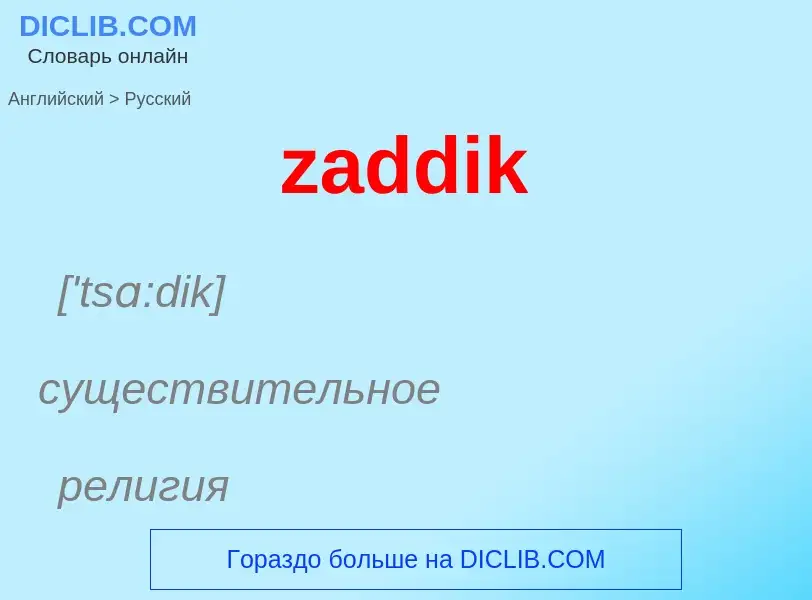Μετάφραση και ανάλυση λέξεων από την τεχνητή νοημοσύνη ChatGPT
Σε αυτήν τη σελίδα μπορείτε να λάβετε μια λεπτομερή ανάλυση μιας λέξης ή μιας φράσης, η οποία δημιουργήθηκε χρησιμοποιώντας το ChatGPT, την καλύτερη τεχνολογία τεχνητής νοημοσύνης μέχρι σήμερα:
- πώς χρησιμοποιείται η λέξη
- συχνότητα χρήσης
- χρησιμοποιείται πιο συχνά στον προφορικό ή γραπτό λόγο
- επιλογές μετάφρασης λέξεων
- παραδείγματα χρήσης (πολλές φράσεις με μετάφραση)
- ετυμολογία
zaddik - translation to ρωσικά
['tsɑ:dik]
существительное
религия
цаддик
святой
праведник
религиозный наставник (у хасидов)
Βικιπαίδεια

Tzadik (Hebrew: צַדִּיק [tsaˈdik], "righteous [one]", also zadik, ṣaddîq or sadiq; pl. tzadikim [tsadiˈkim] צדיקים ṣadiqim) is a title in Judaism given to people considered righteous, such as biblical figures and later spiritual masters. The root of the word ṣadiq, is ṣ-d-q (צדק tsedek), which means "justice" or "righteousness". When applied to a righteous woman, the term is inflected as tzadika/tzaddikot.
Tzadik is also the root of the word tzedakah ('charity', literally 'righteousness'). The term tzadik "righteous", and its associated meanings, developed in rabbinic thought from its Talmudic contrast with hasid ("pious" honorific), to its exploration in ethical literature, and its esoteric spiritualisation in Kabbalah.
Since the late 17th century, in Hasidic Judaism, the institution of the mystical tzadik as a divine channel assumed central importance, combining popularization of (hands-on) Jewish mysticism with social movement for the first time. Adapting former Kabbalistic theosophical terminology, Hasidic philosophy internalised mystical experience, emphasising devekut attachment to its Rebbe leadership, who embody and channel the Divine flow of blessing to the world.


![biblical]] figures in Judaism, Joseph is customarily called ''the Tzadik''. biblical]] figures in Judaism, Joseph is customarily called ''the Tzadik''.](https://commons.wikimedia.org/wiki/Special:FilePath/027.Joseph Interprets Pharaoh's Dream.jpg?width=200)


![Kingship]], Earth, [[Shekhinah]], [[Israelites]]. Kingship]], Earth, [[Shekhinah]], [[Israelites]].](https://commons.wikimedia.org/wiki/Special:FilePath/The one träd.jpg?width=200)
